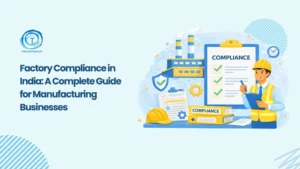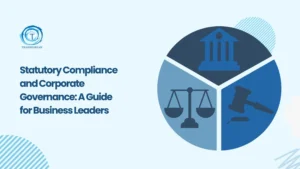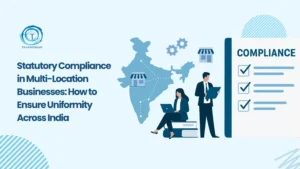Due compliance is not a negotiable requirement of any business in India, but there is a new challenge which is posed to small and medium businesses (SMBs) namely constant evolution of statutory compliance provision. The process of decoding the maze of labour mandates, tax policies and industrial guidelines is time-wasting and taxing to the resources at hand. Most SMBs in the current competitive environment are realizing that statutory compliance outsourcing is not only a cost reduction strategy but a strategic decision to guarantee continuity business, mitigate risk, and enjoy growth.
What is Statutory Compliance, and Why Does It Matter for SMBs?
Statutory compliance involves compliance to laws and regulations laid down by central, state and local branches of government. This includes but is not limited to employee salaries, tax deductions, social benefits, safety regulations, environmental regulations, Goods and services tax, Provident fund and Employees state insurance. To SMBs, all these obligations can require the use of internal resources to the point of depriving the business of best efforts.
Key pain points include:
- Frequent regulatory changes that demand continuous updating.
- Risk of penalties due to missed deadlines or errors.
- Limited access to expert advice and automation tools.
- Resource constraints making in-house compliance teams unviable.
Key Areas Where Compliance Is Critical
- Labour Law Compliance: Shops & Establishment Act, Payment of Wages Act, Minimum Wages Act, Payment of Bonus Act, and Maternity Benefits Act.
- Social Security Compliance: Managing PF & ESIC filings, employee registrations, challans, UAN generation, and inspection support.
- Factory Compliance: Factories Act, pollution control certifications, hazardous material handling licenses.
- Taxation & Returns: GST compliance outsourcing for timely input credit, reconciliations, and filing.
- Employment & Payroll Compliance: Payslip regulations, gratuity, labour welfare contributions, and state-specific leaves.
- Contract Labour & Vendor Compliance: Third-party compliance tracking and documentation for principal employers.
Why SMBs Should Seriously Consider Outsourcing

1. Cost Efficiency and Focus on Core Business
It is usually expensive to establish an internal compliance department especially for SMBs. The costs of being hired, continuous training, software licensing, and legal subscriptions could accrue to great overheads. Outsourced compliance management allows you to turn fixed costs into variable costs, spend only money on the services you require, and avoid hiring, upskilling, and system upgrade on a regular basis.
2. Expertise Across Laws and States
There is a lack of coherence in the regulatory framework of India. Although there are some, such as PF, ESIC, and GST, whose rules are centrally regulated, not all go to a state-level rule (In Maharashtra, there are different norms of the Shop Act in existence as compared to that of Karnataka and Gujarat).
A compliance consultant has pan-India legal experience, having an insight of knowing the localities of various areas in terms of registration, time taken in returns, or due to a department inspection. You have access to geographical experts via PAN India compliances agency, there is no need to use numerous local experts to provide you with coverage across the geographical spheres.
3. Technology Integration and Digital Transformation
Top partners are more than providers of manual services; they provide digital compliance automation services, such as e-filing services, rule-driven reminders and notifications, cloud-hosted records storage, audit-ready reporting, and access to dashboard with live results displaying the compliance health of your organization. The method ensures that compliance is a business process and not a process that is done occasionally and in crisis.
4. Scalability Without Headaches
As your team increases or when you move to a new state, your complications with compliance increase. Are you aware of Shops and Establishments registration standards of a new branch in Hyderabad? What happens to labour laws beyond the 20 employees mark?
A good company compliance services provider develops alongside you. They deal with documentation, licensing and statutory changes so that your HR and finance personnel are not over burdened.
5. Better Accuracy and Timely Filing
With automation tools and workflow trackers, compliance partners offer tech-enabled compliance management solutions. Instead of filing reminders, audit trails, and real-time dashboards, such systems promise no downtime and increased clarity.
Also, automation related to compliance minimizes the possibilities of human error in compiling, calculations and reduction.
6. Enhanced Audit Readiness and Documentation
Statutory or regulatory audit preparations are costly. Any compliance management solutions provider would ensure that there are auto archive and easy retrieval of all the records, returns, registers, payroll slips, tax challans etc. It implies that you are ever prepared against inspections, and the paperwork is clean and stored online.
Key Services Provided by Modern Statutory Compliance Outsourcing Partners
| Service Offered | Description |
| Payroll Compliance | Processing payroll in line with all statutory deductions, TDS, PF, ESIC, professional tax, etc. |
| GST Compliance Outsourcing | End-to-end GST registration, returns, audit support, and documentation management |
| Labour Law Compliance | Adherence to Shops & Establishments Act, Factories Act, CLRA, and other local labour statutes |
| PF & ESIC Consultant | Registration, returns filing, remittances, inspections, and representation in government matters |
| Compliance Automation | Implementation of digitally managed compliance schedules, auto-updates, document storage, and audit trails |
| Vendor and Third-Party Compliance | Monitoring and managing supplier documentation, anti-bribery, anti-corruption declarations, and certifications |
| Internal Audit Support | Regular reviews and reporting to monitor and address emerging compliance gaps |
Gaps in Traditional In-House Compliance Management
When dealing with the compliance on their own most SMBs use the services of HR or finance employees. However, they are usually unable to access the necessary bandwidth or legal knowledge to decode complicated changes or deal with a variety of regulatory norms. This results into:
- Missed deadlines or incorrect filings
- Failure to update licenses post amendments
- Non-maintenance of compliance registers
- Delays in inspections or legal notices
- Non-conformity with state-specific labour laws
These loopholes eventually lead to millions of fines, losses of businesses in others and even litigation processes. These risks are circumvented by outsourcing, which introduces the specialized focus of attention along with active monitoring.
Sector-Wise Use Cases

- Startups: New founders who are on a mission to both build a product and raise capital will get the peace of mind and professionalism that an outsourced compliance service provides without adding a new headcount on the payroll.
- Manufacturing SMEs: Labour-intensive sectors need rigorous documentation and adherence to labour laws. Compliance liability Outsourcing avoids compliance liability and provides better vendor discipline.
- Retail Chains & Franchises: Expending outlets within states? Pan India compliance agency provides compliance of Shop Act, LWF, ESI and PT in region-based manner and without any in-house bottlenecks.
- Tech & IT Services:: Since we are remote and established in multiple states, taxation, leave policies, and employment contracts are diverse. A compliance consultant will make everything smooth in terms of documentation and filings.
Choosing the Right Compliance Partner
Not all vendors are equal. When evaluating a compliance consultant, assess:
- Industry expertise and client portfolio
- Coverage across Indian states
- Knowledge of your sector (manufacturing, tech, retail, etc.)
- Tools used for compliance automation
- Support in case of notices or litigation
- Ability to scale with your business
In addition, determine whether they offer personalized company compliance services or are ready to sell blanket services.
The Future of Compliance: From Reactive to Strategic
SMEs do not consider compliance as a back-office issue any longer. The best managed SMBs view it as a reputation boost, business facilitator and pillar of operation. In the era of changing legislations regarding gig employees, digitalization of the inspection process, and investor investigation, compliance is no longer an inert matter.
Statutory outsourcing to a team of competent professionals guarantees not only reduction of risk, but also operational excellence.
FAQ’s
Small businesses benefit by saving time, reducing legal risk, improving accuracy, and avoiding penalties without needing a full in-house legal team.
Non-compliance can lead to fines, business shutdowns, legal action, loss of credibility, and issues during audits or investor evaluations.
hey use legal experts, tech-enabled tools, and automated workflows to ensure timely filings, proper documentation, and regular compliance audits.
Compliance automation ensures reminders, real-time dashboards, digital filings, and audit trails, reducing manual errors and delays.
Look for industry experience, PAN-India coverage, legal tools, scalability, client testimonials, and support for sector-specific laws.

















